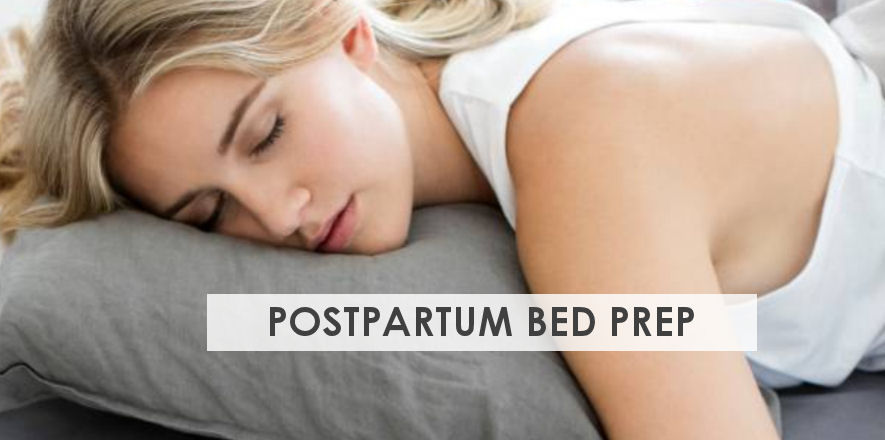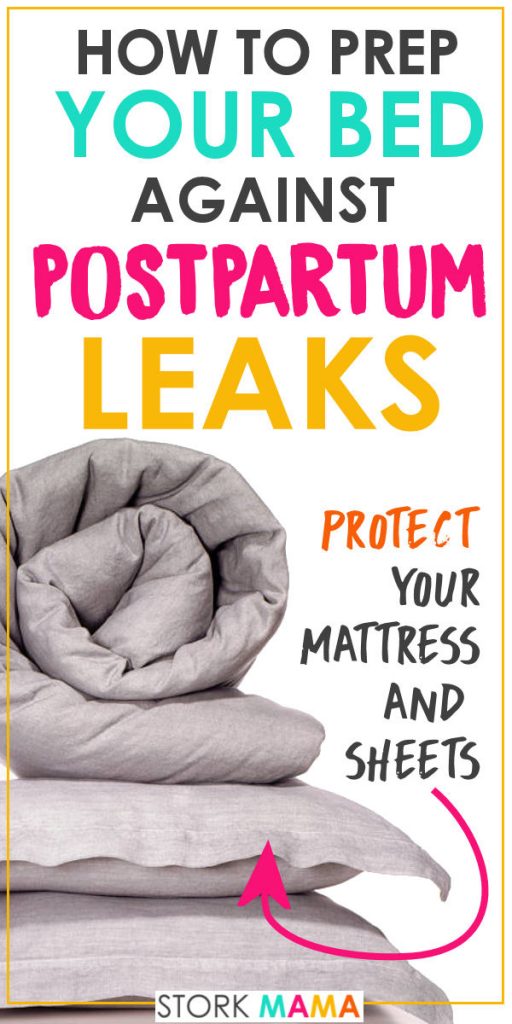Have you thought about how you’ll prepare your bed for postpartum?
Yes, I know that’s one of the most random questions someone’s asked you during this pregnancy.
Trust me, a week into your postpartum you’re gonna thank me.
I’m gonna tell you about how to set up your bed to protect it during your postpartum.
And if that seems a little OCD to you, it won’t after I tell you about the one thing your body does A LOT during postpartum.
Leaking. Yes, I did say leaking. Urgh, What?
Your body leaks from pretty much every orifice during postpartum.
Never trust those lovely photos of postpartum moms dressed top to toe in white, with white bed sheets. Err yeah, that just doesn’t happen.
Let’s look at what body fluids love to escape from you during postpartum.
Types of Postpartum Leaks
Bleeding
You should probably know by now that you’re gonna bleed for a few weeks after you have your baby. All moms do, whether you have a vaginal or a C-section birth.
Yep, you enjoy those nine period-free months, and now you gotsta pay back your dues.
The bleeding comes from the area where your placenta separates inside. Your womb will then shrink back to its normal size. The flow will be pretty heavy for a week or so, then starts to get less.
Breast milk
Now you’ve got your baby; your body wants to feed them. Whether you choose to breastfeed or not, you’re gonna make breast milk.
Around 3-4 days after birth, your boobs will fill with mature breast milk, and it’s gonna want to escape. Get prepared for the tell-tale wet patches on your tops.
If you don’t breastfeed, it will pass in a day or two. But if you are breastfeeding, your boobs are gonna leak randomly until your supply establishes. This leaking can last for around 6-12 weeks. And even after that, the leaking suddenly reappears when your baby has a growth spurt.
Night Sweats
I find it to be my mission to tell unsuspecting moms-to-be about the postpartum sweats.
Why does no one ever tell you about the all the frickin sweating!
I was so unprepared for this one. Sometimes at night, I’d wake up soaked. The blood I could deal with, but the sweats had me beat.
And the worst news is they can last for up to 6 weeks postpartum.
Incontinence
Your new baby is a darling, but their birth can do some real damage to your body.
Birth plays havoc with your pelvic floor muscles. And those are the ones that control your bladder.
It’s common to experience some bladder control issues after birth. That means you may dribble a little bit of urine if you don’t anything strenuous like coughing, sneezing, or heavy lifting.
You need to start looking after your pelvic floor. That means doing your Kegels regularly. It can take 3 to 6 months to recover these muscles after birth.
Related: How to Cope With Your Postpartum Night Sweats
Pin For Later
6 Ways to Prep Your Bed for Postpartum Leaks
You’ll see that Mother Nature wants you to get very familiar with bodily fluids when you have a baby. You know, it’s as if she thinks constantly cleaning up dirty diapers and baby vomit all day isn’t enough.
Learn from my mistakes; I was so not prepared for any of this. My mattress and sheets were unfortunate victims during this time. But I’m gonna share my strategy from my second and third babies, to save your bed.
Give me high five, for not having to change your bed sheets daily, or scrubbing gross yellow sweat stains out your mattress.
1. Mesh Pants
The bleeding is gonna be your biggest battle. It’s heavy and bright red, and it will make the most mess.
The battle plan is to arm yourself with those huge mesh panties for the first week. Your hospital may provide you with some, so fill your bag with them before you go home.
If you need to get your own supply, I recommend these, they are good value and work really well.
Now I know wearing an adult diaper is not something you thought you’d be dong at this age. But hear me out.
Mesh pants take care of two postpartum issues. First off they deal with your heavy bleeding and prevent leaks. Second, they are disposable, so you can chuck them away and save your nice underwear.
Once your bleeding changes from red to pink, you can use cheap underwear and maternity pads instead.
2. Nursing pads
The first layer of protection against the boob leakage is to use nursing pads.
These are small circles of fabric you put into your bra to absorb leaking breast milk. They are available as disposable and reusable pads. If you’re unsure which ones to get, check out my guide to nursing pads here.
I’d recommend using them with a sleep nursing bra during the night. A good sleep bra is clasp-free and comfortable to sleep in. Plus it holds to pads and allows easy access for feeding your baby overnight.
Don’t fall into the trap of thinking you won’t need nursing pads. Your breasts fill up when you go for longer stretches overnight. And the slightest touch or your baby crying will make you leak.
Imagine these small leaks like you pouring a capful of milk onto your mattress every day. Gross right? Milk is sweet, sticky and goes sour. Plus bacteria love to live in milk.
Your nursing pads will stop all those little leaks even reaching your mattress when your asleep and unaware it’s happening.
3. Chux Pads
When you have your baby, you’ll see maternity staff using lots of those disposable incontinence pads they call Chux.
Nurses and Midwives love these because they deal with all manner of postpartum leaks. Plus you can use them for diaper changes too.
Before you leave the hospital take a few home with you. They are great for using at home in those first few days when you’re bleeding heavily.
You can simply chuck them away and don’t need to worry about washing anything. That’s right; you don’t need to do laundry, that’s words every postpartum mom wants to hear.
If you can’t get any from hospital stock up on some before your baby arrives. That way they’ll be ready for you when you get home.
Read: The Best Postpartum Underwear Reviews
4. Quilted Bed Pad
This is my secret weapon for postpartum. The quilted bed pad.
Now I love Chux. They are awesome for dealing with the initial heavy bleeding. However, my biggest problem with them was the plastic backing made my night sweat so much worse.
As I was breastfeeding, I needed along term bed pad, but I couldn’t stand using the Chux for more than a few days. I tried using a towel to sleep on instead, but the material was too thick and bunched up.
Enter the quilted bed pad. Seriously, this pad changed my postpartum life.
I got better sleep because I wasn’t so worried about leaking all over the place during the night. Because it’s absorbent, I wasn’t sleeping in a wet patch and waking up uncomfortable. Then if it got stained, I chucked it in the wash, rather than needing to strip my whole bed sheets.
Winner winner, chicken dinner.
5. Dark Bed Sheets
Do you want to be sleeping on your expensive, high thread count sheets when you’re leaking everywhere? Nope, didn’t think so.
I’d recommend changing your bed linen to an older set if you have one. That way if it gets ruined you can just chuck it out.
If you have white or light colored sheets, consider buying a cheap set of dark, cotton bedsheets until postpartum passes.
It will save you having to scrub out stubborn stains, and once you’re done, you can pack them away for your next pregnancy.
Be sure to try and get cotton sheets as mixed blends can cause you to overheat and make your night sweats worse.
For a good quality and budget-friendly set check out this one from Amazon Basics. Now that one is cheap, but it’s made from polyester.
If you want to keep cool, go for cotton. I’d recommend this reasonably price set from Cottington Lane.
6. Detergent
If you don’t want to opt for any of my suggestions above, at least have a good detergent on hand.
If you get blood onto your sheets, you’re gonna need to act fast to stop it staining your linen.
I personally love the 3-in-1 Tide Pods for getting blood stains out easily.
I recommend using a biological detergent (one with enzymes), so it breaks down the blood well. Just be careful if you have really sensitive skin as a biological detergent will irritate you. The alternative is to use a non-bio detergent, but it may not clean the stain so well.
Remember the blood may have leaked through onto your mattress, and you’ll need to scrub that too.
Use 3% hydrogen peroxide in a spray bottle. Spritz it over the stained area and then rub it with a dry towel. Repeat this until the stain is gone. Then, leave the mattress to air dry before you put your bedlinen back on. Your mattress will be as good as new.
Now seriously, all that sounds like waaaay too much unnecessary work for a new mom. So don’t let it get to that stage and follow my prevention steps before then! To buy the items I’ve suggested click the photos below.
Summary
Postpartum brings with it a few problems you have to deal with. Mainly all the leaking!
Blood, milk, sweats, and probably a few tears too!
By preparing your bed before baby arrives, you’ll save yourself a lot of work.
Protect yourself and your bed from the leaks, and you won’t need to scrub, wash or replace expensive bed linen.
Plus you’ll get a more comfortable nights sleeps even when the night sweats are in full force.
Now get yourself prepared Mama, you’ve got this.













